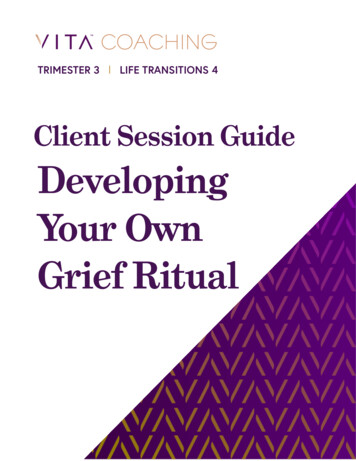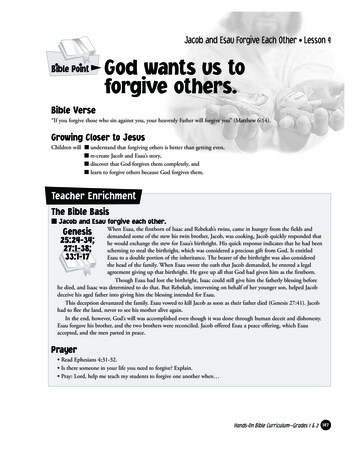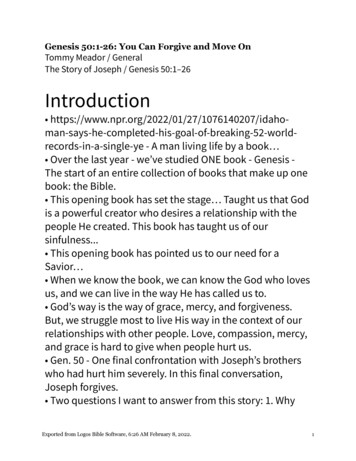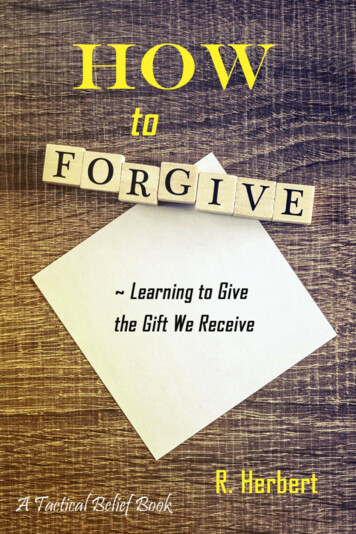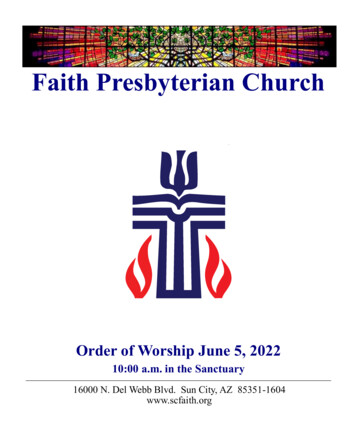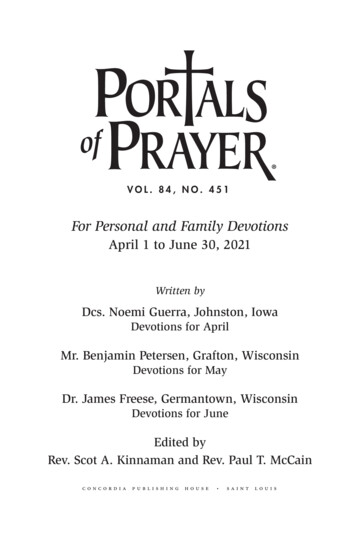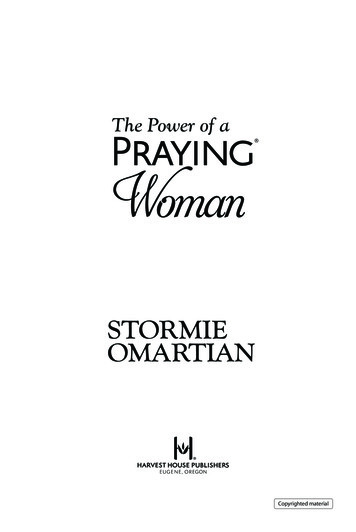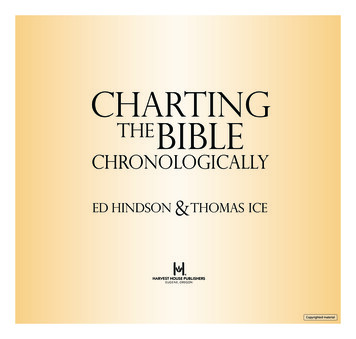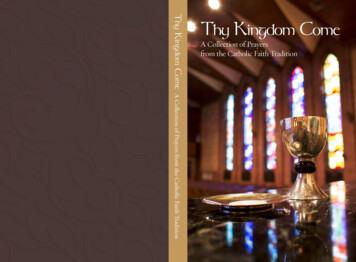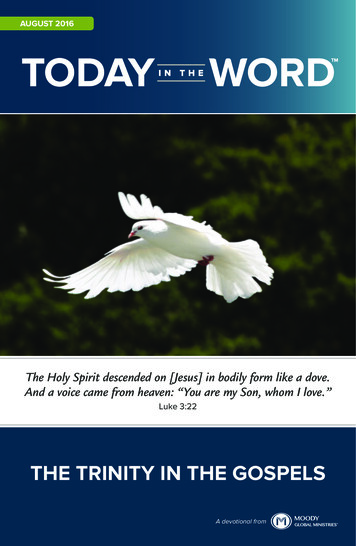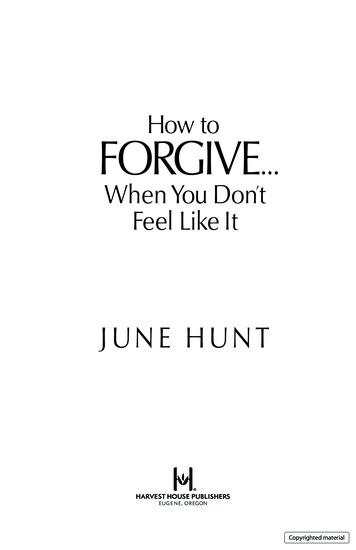
Transcription
How toFORGIVE When You Don’tFeel Like ItJ UN E H UN TCopyrighted material
Unless otherwise indicated, all Scripture quotations are taken from the HOLY BIBLE, NEWINTERNATIONAL VERSION . NIV . Copyright 1973, 1978, 1984 by the InternationalBible Society. Used by permission of Zondervan. All rights reserved.Verses marked esv are from The Holy Bible, English Standard Version, copyright 2001 byCrossway Bibles, a division of Good News Publishers. Used by permission. All rights reserved.Verses marked nkjv are taken from the New King James Version. Copyright 1982 by ThomasNelson, Inc. Used by permission. All rights reserved.Italicized text in Scripture quotations indicates author’s emphasis.Cover by Garborg Design Works, Savage, MinnesotaCover photo Peter Gerdehag / JupiterimagesHOW TO FORGIVE.WHEN YOU DON’T FEEL LIKE ITCopyright 2007 by Hope for the Heart, Inc.Published by Harvest House PublishersEugene, Oregon 97402www.harvesthousepublishers.comISBN 978-0-7369-5589-8 (pbk.)ISBN 978-0-7369-5590-4 (eBook)Library of Congress Cataloging-in-Publication DataHunt, June.How to forgive—when you don’t feel like it / June Hunt.p. cm.ISBN 978-0-7369-2148-01. Forgiveness—Religious aspects—Christianity. I. Title.BV4647.F55H86 2007234'.5—dc222007007023All rights reserved. No part of this publication may be reproduced, stored in a retrieval system,or transmitted in any form or by any means—electronic, mechanical, digital, photocopy,recording, or any other—except for brief quotations in printed reviews, without the prior permission of the publisher.Printed in the United States of America15 16 17 18 19 20 21 22 23 / VP-SK / 10 9 8 7 6 5 4 3 2 1Copyrighted material
This book is dedicated to my forever friend, Barbara to the first friend willing to extend full forgiveness to me to my “grace friend” who was willing to look beyond my faultand see my need. Thank you for allowing God to use yourforgiving heart to be a part of my emotional and spiritualhealing. You consistently give me hope for my heart. Copyrighted material
AcknowledgmentsI have the privilege of working with what I believe is the greatest ministry team on earth—the dedicated staff and volunteers of Hope forthe Heart. Thank you for your faithful prayers and support.With heartfelt appreciation to:—Carolyn White, Elizabeth Gaston, Jill Prohaska, andBarbara Spruill, who worked countless hours to fine-tunethe manuscript—Keith Wall, who converted a mountain of interview notes,audio archives, and written materials into a wonderful firstdraft—Mark Overstreet, Brad Ray, and Jeanne Sloan, who helpedme think about rocks in a new way!—Connie Steindorf, Bea Garner, and Titus O’Bryant, whosebehind-the-scenes support work was invaluable—Steve Miller, my Harvest House editor, whose deft touchgraces these pages, and—Kay Deakins (who deserves a medal) for keeping the restof us on task during this entire process.Finally, I give highest praise to my Lord and Master, Jesus Christ, fornot giving up on me. His forgiveness is why I have a story to tell aboutthe lifechanging freedom of true forgiveness.On a Personal NoteThroughout the writing of this book, I have repeatedly thought aboutthose whom I have hurt in the past.and my heart has grieved. I amwithout excuse. I cannot help but ask forgiveness from the deepest partof my heart. Many times I have prayed, “Lord, may I see my sin as Yousee it—may I hate my sin as You hate it.” He has painfully answeredmy prayer. His cleansing love has enabled me to “walk in the light asHe Himself is in the light” (1 John 1:7 nasb).Copyrighted material
ContentsThe Struggle to Forgive . . . . . . . . . . . . . . . . . . . . .91. “Sticks and Stones May Break My Bones ” . . . . .Words Can Break My Heart112. The School of Hard Rocks . . . . . . . . . . . . . . . . . . .Stockpiling My Stones of Spite173. “Stone Her! Stone Her!” . . . . . . . . . . . . . . . . . . . . .What Forgiveness Is, What Forgiveness Isn’t274. “What Father Gives His Child a Stone?” . . . . . . . .Extraordinary Love, Extraordinary Forgiveness435. Getting Rid of the Gravelly Remains . . . . . . . . . . .The Freedom of Full Forgiveness576. Removing Hard Rocks of Resentment . . . . . . . . . .Choosing Forgiveness over Feelings757. Cutting the Bottom Out of the Bag . . . . . . . . . . . .Resentful Thoughts Released, Not Rehearsed898. Rocks Aren’t Removed Overnight . . . . . . . . . . . . . 103The Four Stages of Forgiveness9. Steering Clear of Stone Throwers . . . . . . . . . . . . . . 119Forgiveness Is One Thing, Reconciliation Is Another10. Breaking the Power of Your Pelter . . . . . . . . . . . . . 135Praying for Those Who Pelt You11. Blindsided by a God-sized Boulder . . . . . . . . . . . . 145“Oh God, How Could You Allow This?”12. Buried Under Rocks of Regret . . . . . . . . . . . . . . . . 159When the Person You Need to Forgive Is YouCopyrighted material
13. The Power of the Empty Bag . . . . . . . . . . . . . . . . . 171Fringe Benefits of Forgiveness14. A Heart of Stone Finds Hope and Healing . . . . . . 185Asking Forgiveness, Finding FreedomAPPENDICESAppendix A . . . . . . . . . . . . . . . . . . . . . . . . . . . . . . 195Why Should We Get Rid of Unforgiveness?Appendix B . . . . . . . . . . . . . . . . . . . . . . . . . . . . . . 198What Does the Forgiving Heart Look Like?Appendix C . . . . . . . . . . . . . . . . . . . . . . . . . . . . . 201The High Cost of Unforgiveness vs. the HighReward of ForgivenessAppendix D . . . . . . . . . . . . . . . . . . . . . . . . . . . . . 203Breaking Spiritual StrongholdsAppendix E . . . . . . . . . . . . . . . . . . . . . . . . . . . . . . 206How Can You Find God’s Forgiveness?Appendix F . . . . . . . . . . . . . . . . . . . . . . . . . . . . . . 209God’s Heart on ForgivenessAppendix G . . . . . . . . . . . . . . . . . . . . . . . . . . . . . 211How to Pray for Those Who Hurt YouAppendix H . . . . . . . . . . . . . . . . . . . . . . . . . . . . . 213Principles for Forgiving Monetary DebtNotes . . . . . . . . . . . . . . . . . . . . . . . . . . . . . . . . . . 215Copyrighted material
The Struggleto ForgiveResentment rage retaliation. Ever struggled with forgiveness? Ever thought it was impossible? Ever knew you oughta butdidn’t wanna? I believe the majority of the world’s population isstruggling with forgiveness—right now! If you are human (whichyou are) and if you are reading this book (which you are), you havebeen hurt—deeply and profoundly—and have faced the formidablefoe of unforgiveness.Each weeknight, I host a two-hour call-in counseling program—Hope in the Night—during which people across America pour outtheir hearts on live radio. I’m constantly amazed at their candor andprofoundly touched by their pain.I’m also grieved over the steady stream of people personallywronged and mistreated by others—from their own family to theirchurch family from casual acquaintances to close neighbors fromcomplete strangers to “best friends.”My heart goes out to the hurting—to those who just want theirpain to stop and want to have hope again.After more than a decade of hearing hundreds of heartrendingstories, I come to the challenge of forgiveness with tremendous compassion. I don’t want those who are hurting to be further hurt byliving with embedded bitterness—simply because they don’t graspthe true meaning of forgiveness or they don’t know the “how to’s”of forgiveness.9Copyrighted material
10How to Forgive When You Don’t Feel Like ItAnd I come to this topic with more than compassion. I come withexperience, having wrestled for years with unforgiveness. Indeed,I have felt its heavy weight. So for me, forgiveness is not merely atheoretical premise or just a theological concept. Forgiveness is areal-world, nitty-gritty matter of the soul.Forgiveness is a decision—an act of the will that, when done right,results in true freedom. It is a process—often misunderstood. Ittook me a long time to learn the why of forgiveness and even longerto live out the heart of forgiveness. The call of God in Colossians3:13 has been the catalyst for my journey: “Bear with each otherand forgive whatever grievances you may have against one another.Forgive as the Lord forgave you.”Through vivid illustrations and riveting real-life experiences, Iwant to connect you with others who have suffered greatly andforgiven much—some who thought they could never find peacebecause of the depth of their pain. And I want to point you to theOne who has been offended the most and has forgiven the most Jesus. He knows your pain, He knows your need, and He knows howto empower you to forgive—even when you feel it’s impossible.Through these pages, my prayer is twofold: (1) that you will learnhow to get rid of the boulders of bitterness holding you back—thoseheavy rocks of resentment—and (2) that you will experience thefreedom of forgiveness—a freedom only possible when you learnhow to forgive even when you don’t feel like it.Copyrighted material
1“Sticks and StonesMay Break My Bones ”Words Can Break My HeartIn my growing-up years, I remember hearing many catchysayings that made a lot of sense, such as, “People who live in glasshouses shouldn’t throw stones,” and “A rolling stone gathers nomoss.”Another popular adage is “Sticks and stones may break my bones,but words will never hurt me.” What I say in response is, “Wrong,wrong, wrong!” We all know that words can break our hearts. TheBible puts it this way: “The tongue has the power of life and death,and those who love it will eat its fruit.”1Words can kill a relationship. Words can murder our motivationand inspiration. This truth was recently driven home to me when Iwas leading a conference in Indiana. “How many of you have really struggled with forgiveness? You’vehad a huge struggle forgiving someone who has hurt you deeply?”Immediately hands go up about one-fourth of the audience.Quickly I scan those with raised hands, looking for someone physically fit.My question comes at the beginning of my talk on forgiveness,11Copyrighted material
12How to Forgive When You Don’t Feel Like Itbut it isn’t until the final 15 minutes that I point to the thirtyishyear-old man.“Sir, I need some help. Would you be willing to join me on theplatform?” Surprised, he nods with a smile and saunters up to thestage. Now we both stand next to a table that has a mound of rocks.“Would you share your name and something about yourself?”“My name is Rick. I’m an accountant, and my hobby is running.When I’m not at work, I’m usually running because I plan to entera marathon this year.”“That’s great, Rick! And thanks for being willing to help.”Reaching over to a small table, I pick up a large gray meat hook,more than two feet long, and a burlap bag. The top of the hook isable to fit around a person’s neck like a horseshoe. A straight shaftextends down a couple feet then arches back up, like a very largefishhook with a sharp point.“Here you go, Rick. Slip this meat hook carefully around yourneck.” His eyes open wide—the hook looks ominous. He gives mea wary glance. Some people in the audience groan (probably justglad they weren’t picked!). Slowly, cautiously, Rick slides the top ofthe hook around his neck. The shaft of the hook reached down hischest to waist level, and the pointed tip was in front of him. I pushthe top of the burlap bag over the tip of the hook.“Rick, at the beginning, when I asked if anyone had struggledwith forgiveness, I noticed you raised your hand.”“That’s right.”“What has been so hard to forgive? Would you tell me what happened?”At this point I reach over to the mound of rocks, knowing thatevery time Rick mentions an offense, I will drop a rock or a smallboulder into the burlap bag. Each rock represents a wrong someonehas committed against him—a wound he is carrying.Rick begins by going back to his childhood. It doesn’t take longfor us to learn that all his “rocks” come from the same source—growing up with a harsh, sometimes tyrannical father who wasCopyrighted material
“Sticks and Stones May Break My Bones” 13unaffectionate and inflexible. As Rick focuses on his father and thewrongs suffered, he speaks softly:“Never accepting me for who I am .” His father’s critical, causticwords force the first rock to fall.“Zero affection .” No hand on the shoulder, no hugs, no patson the back earn a fist-sized rock flung into the bag.“No play time .” No playful wrestling, no playing catch, noplaying anything—they all warrant another weighty rock. The moreRick remembers, the more he elaborates on what he has missed.“No father-and-son times .” No hanging out together, no talksabout manhood, no career conversations. This drives another rockdownward. Rick continues pushing the emotional “replay button”buried in his memory.“Screaming .” A sudden, fearful flashback causes Rick to wince.All the yelling and verbal attacks generate a sizeable jagged rock.“Hurting my mother .” His father’s grating emotional andverbal abuse sends a sizeable sandstone dropping into the bag.“Get out of my sight! ” His devaluing, denigrating words propela big hefty boulder.“Rejection .” sums up the emotional impact of all his father’swounding. Momentum drives a very large, hard rock into Rick’sbag. It crashes against the other rocks inside, leaving some small,sharp-edged fragments. Jagged pieces are painfully wedged in Rick’smemory. Ultimately, rejection says it all.Expanding on the visual, I tell Rick he has a bag of rocks residingin his soul. For years he has been hauling rocks of resentment, stonesof hostility, and boulders of bitterness. Then I point to the baghanging from the hook around his neck—the burlap now strainingfrom the weight of the rocks.“What would happen if you were to keep walking around withthat bag of rocks hanging onto your hook the rest of your life?”He immediately responds, needing no time to think, “I wouldn’tbe able to run anymore.” I am surprised and glad at his answer. Insteadof saying, “I would become bent over,” or “It would be difficultCopyrighted material
14How to Forgive When You Don’t Feel Like Itto walk,” Rick, the devoted athlete, expresses concern that he couldno longer run.His response articulates so well the cost of failing to get rid ofcumbersome “rocks.” Think of all the scriptures that refer to running.The apostle Paul says, “Do younot know that in a race all theWhen we forgive, we get rid ofrunners run, but only one getsthe rocks dragging us down andthe prize? Run in such a way asdepleting our strength.to get the prize.”2 And he asked,“You were running a good race.Who cut in on you and kept you from obeying the truth?”3What Rick said from a physical standpoint—“I wouldn’t beable to run anymore”—is just as true emotionally and spiritually.Weighed down by too many rocks, the best we would be able to dois trudge our way through life. If more rocks are added to the pile,we’ll barely be able to move forward. And if even more rocks arethrown on the heap, we will completely collapse under the weight.But when we learn to forgive—even when we don’t feel likeit—we get rid of the rocks dragging us down and depleting ourstrength. As we work through the process of forgiveness, we are setfree from the pressure of the strain we feel unshackled we feelreleased we feel free!The prophet Isaiah describes what this freedom is like: “They willsoar on wings like eagles; they will run and not grow weary, theywill walk and not faint.” 4Now back to Rick: The last thing I want to do is leave thiswounded young man weighed down by emotional pain. I want tosee him run!“Rick, do you want to live the rest of your life carrying all thispain from your past?”“No, I don’t.”“Then are you willing to take all the past pain off of your hookand place it onto God’s hook?”“Yes, I am.”Copyrighted material
“Sticks and Stones May Break My Bones” 15“Would you be willing to take your father off of your emotionalhook and place him onto God’s hook?”“Yes, I want to.”In prayer, we both go before God’s throne of grace. “Lord Jesus,”I start.“Lord Jesus,” he echoes, “thank You for caring about my heart and how much I’ve been hurt You know the pain I have felt because of my father’s treatment his anger his lack of affection his abuse his rejection.”All of a sudden, throughout the crowd, the unexpected occurs.As Rick repeats the prayer, making it his own, an undercurrent ofprayers—barely above a whisper—waft across the room. Goosebumps rise on my arms. Feeling a holy sense of awe, I realize thaton this day, more than one bag of rocks is soon to be empty.“Lord, I release all this pain into Your hands .Thank You, LordJesus for dying on the cross for me and extending Your forgiveness to me . As an act of my will I choose to forgive myfather.”As Rick continues to pray, a remarkable change takes place. Hisvoice, initially reserved, swells with determined strength.“I choose to take my father off of my emotional hook andright now, I place him onto Your hook . I refuse all thoughts ofrevenge . I trust that in Your time You will deal with my father just as You see fit. And thank You, Lord, for giving me Your powerto forgive so that I can be set free . In Your holy name I pray.Amen.”Rick’s tears of gratitude reveal he is now experiencing the freedomof forgiveness. And at this same time, through the power of forgiveness, many bags of bitterness throughout the auditorium havebeen emptied.Personally, I know what it feels like to be weighed down with therocks of resentment. If you, too, feel such a weight, I understand.Just know, the words within this book are written with one goal inmind—to leave you with an empty bag.Copyrighted material
Copyrighted material
2The Schoolof Hard RocksStockpiling My Stones of SpiteThe decision to write about the pain of my childhood was notmade quickly or easily. I have written on many other topics withoutdivulging details about my growing-up years. However, as a matterof integrity, I cannot write a book on forgiveness without explainingthis painful period—without sharing memories that for years stucklike shards in my soul, deadening my emotions.The most overwhelming tests in my life have involved my relationship with my father, a man who was hard as flint and whoseanger could spark at even the slightest annoyance. Without thesetests, I would have no testimony—especially regarding forgiveness.And without a testimony, there would be no platform for the ministry God has given me. Mine is a story of learning to forgive evenwhen I didn’t feel like it.I grew up in a family full of secrets—secrets we dared not discusswith one another, much less friends. Our family was dysfunctional,full of fear and facades, dissension and disruption. My father’sfrequent and flagrant acts of immorality went totally unchecked.Throughout my tumultuous growing-up years, Mother held themost precious place in my heart. She was unfailingly kind, gracious,and loving. I adored her.My father, on the other hand, was an enormous success in hisprofessional life, but an enormous failure in his family life. He had17Copyrighted material
18How to Forgive When You Don’t Feel Like Ita looming, larger-than-life presence, always seen in his business“uniform”—navy blue suit, light blue shirt, blue bow tie—which hewore every day, seven days a week. He was recognized as a visionaryleader who provided hundreds of jobs through his various businessventures.While considered a great man by many outside our home, he wasviewed as an oppressive man inside our home. So unpredictable washis temper that around him, we were all eggshell-walkers.Rocks of resentment accumulated in my bag on a regular basis.When my father became romantically involved with my mother,he was more than twice her age. Unbeknownst to her, he was amarried man with six children, the second-born being her age. Mymother’s father had died of tuberculosis when she was just threeyears old; therefore, I believe she lived with a father-void in herReshaping a Hardened HeartFlint is a hard, sedimentary form of quartz with a glassy appearance,and its color can vary—dark brown, gray, blue, or black. When struckagainst metal, its sparks ignite gunpowder. When hit with another hardobject, its “splinters” or “blades” can be shaped into sharp arrowheads and knives. For centuries, flint has also been used to build stonewalls.Unforgiveness can make your heart hard and dark like flint, and overtime, you can amass enough bitterness to build an impenetrable wallaround your soul. But when you surrender your hardened heart to theMaster Stonecutter, He reshapes your heart to look like His—sensitive to the needs of others.Only by dislodging the flint from your fortified wall and giving it tothe Lord will He refigure your heart to be like His. Realize that ratherthan condemnation, He offers compassion. Rather than judgment, Heextends mercy. By releasing the flint into His hands—the flint of unforgiveness—He will reshape your hardened heart and make it like His.Copyrighted material
The School of Hard Rocks 19heart. This void made her vulnerable to a persistent, persuasivefather-figure—even after she became aware that the relationshipwas wrong.We lived as his covert family on the side—Mother and we fourchildren, me being the second-born. Over time, our secret becamea big rock to bear, eroding my sense of security.For the first 12 years of my life, I grew up with a different lastname—I was June Wright. Dad said we were “the Wright family”because he and Mother were doing what was right. However, for yearsMother lived with both unrelenting guilt and horrendous shame.Every Sunday, she drove us to church, and although she deeplylonged to go inside, she felt much too unworthy. She would walk uschildren to the door, but then she would stay outside. Shame pouredfrom every pore of her being. Many times I saw agony on her face.Her tender heart was no match for my father’s power, abuse, andfear tactics. She felt trapped with no way out.All during those early years, I ached for my mother—she had nofriend, no confidant. Although I was not a Christian at the time, Iremember praying, “God, please give my mother a friend.” She feltafraid to have friends because she was fearful of bringing shameupon them.One December, a year after Dad’s first wife died, he broughtus all to live in his house. The following November, Dad marriedMother and soon afterward, I became known as June Hunt.You would think this change in circumstance would have madethings simpler, but it didn’t. Sometimes I got stuck not knowing howto answer sensitive family questions such as, “Is he your real fatheror not?” My “new name” was difficult to explain because my birthcertificate already read Ruth June Hunt. No one coached me.Subsequently, my bag of rocks only grew increasingly heavy.Dad was excessively possessive of Mother. Beautiful, submissive,and charming, she was the classic “trophy wife.” He proudly showedher off to his frequent dinner guests. She shone like a jewel againstthe dark backdrop of my father’s granite disposition.Copyrighted material
20How to Forgive When You Don’t Feel Like ItWe four were forbidden to speak at mealtimes—“Children areto be seen, not heard”—unless there was a topic of conversationthat would be of interest to everyone. Since nothing we said wasever of interest to Dad, we rarely spoke. Many stones of aggravationfell into my bag, especially during dinner. What’s more, Dad toldme numerous times, “You are a bad influence on your mother.” Orsometimes he would say, “All of you children are a bad influence onyour mother!” So immediately after dinner we had to go upstairs,stay in our rooms, and study. We were not allowed to see Mother.This nightly restriction created sizeable stones to bear—especiallyfor my younger sisters, Helen and Swanee.Mother’s heart ached over Dad’s possessiveness and all his prohibitions. After dinner, she would use any excuse to run upstairs inorder to make the rounds, room by room checking on us, huggingus, encouraging us. Nurturing our tender hearts was her true priority—although Dad denied her that right.In contrast, the compassion required to nurture a child was notfound in Dad.Our family had a little silver poodle named Bambi. I loved herdearly. She was my best friend—the only one with whom I had evershared my heart. As a freshman in high school, I needed to writean English paper. For the first time ever, I decided to get inspiration at a nearby lake.Paper finished and walking back, I saw something unidentifiablein the road. As I got closer, all I could exclaim was, “No no no!”I had no idea that Bambi had followed me. To my horror, my littleconfidant had been hit by a car and killed.My heart was crushed. Sobbing with grief, I picked up her limpbody and slowly walked back home in a daze. As I approached thedoor, Dad walked up from the opposite direction, having just arrivedfrom work. He saw me sobbing with lifeless Bambi in my arms.Rather than offering words of comfort, he tore into me. “Howcould you be so stupid? Bambi is dead because of you! Look whatyou did!”Copyrighted material
The School of Hard Rocks 21His scathing rebuke spewed forth like lava scorching my alreadybroken heart. Bam!To make matters worse, hurtful words gushed out again, “Cryingis a sign of mental illness—stop crying!” At that moment, in mytraumatized state, I knew I must not cry one more tear—so I didn’t.And for years, I would not allow myself to cry, even though I knewsuch suppression was unhealthy.Dad’s repeated volcanic eruptions culminated in layer upon layerof solidified molten rock in my emotional bag.It’s hard to admit, but I hated my father with a seething rage.At age 15, I posed a veiled question to a friend’s father who was alawyer. “If a 15-year-old boy commits murder, what would happento him?”“Well, at 15, he’s a minor, so he would probably be sent to juvenile detention until he’s 18, and then released.” That’s all I neededto know.Two weeks later, I approached Mother with a proposition. “Mom,I need to talk with you. I’ve figured out a way to kill Dad. Therewon’t be much repercussion on me because I’m a minor.” I wasdead serious.I’m so grateful for my mother’s response. She did not chide me,laugh at me, or ridicule me. Instead, she sympathetically said, “No,honey, I appreciate what you’re trying to do, but that really won’t benecessary.” It’s not that I wanted to commit murder—I just wantedthe pain to stop.Perhaps getting rid of Dad would help me get rid of all my rocks,stones, and boulders.In truth, my mother and I experienced a role reversal as I triedto be her protector. But no matter how hard I tried, I didn’t havethe power to keep her safe. Sometimes Dad would come into mybedroom and dogmatically allege, “Your mother is mentally illtoday.” Cringing at his words, I knew to take his words seriously—his eldest son from his first marriage had been institutionalized foryears with paranoid schizophrenia.Copyrighted material
22How to Forgive When You Don’t Feel Like ItRocks of rancor fell into my bag every time he made such frightening statements.I knew on one particular day, Mother had tears in her eyesbecause Dad was flaunting one of his “women friends” namedGinger. I knew tears were not a sign of mental illness. However,my concern was this: Dad had money, money buys power, powerbuys people. I was deathly afraid Dad would buy off a psychiatristto institutionalize Mother.Dad terrorized Mother, not just by asserting she was mentally ill,but also by taking her to different psychiatrists. Although no doctorever diagnosed Mother with anykind of mental disorder, justWhen I came home fromthe mention of mental illnessschool each day, I never knew ifstruck terror in her heart—andMother would be there.mine. For years, these bouldersweighed me down.When I came home from school each day, I never knew if Motherwould be there. I feared Dad really would have her institutionalizedone day. Early on, I began my defense fund. I knew if he ever hadher committed, I’d need to hire a lawyer to get her out. For years Iwould never buy a Coke or candy bar. Instead, every penny I possessed went into “The Defense Fund.”I lived in daily dread of what might happen to Mom. Until oneday, in the midst of one of Dad’s rampages about Mother’s mentalstate, I lost it. “Has it ever occurred to you that you might be theone mentally ill?” I sniped.Instantly, my father retaliated physically. I was stunned. Hisactions devastated me. Yet I was determined he would not makeme cry, and he didn’t. I won! until the next morning, and thenbam—the biggest boulder of all fell into my already-bulging bag.My father sent me away to boarding school for several months. Iwas only ten minutes away from home, but I might as well havebeen in Siberia.Dad often spat out accusations toward or about all of us. SeveralCopyrighted material
The School of Hard Rocks 23summers in a row he matter-of-factly stated to me, “You and yoursisters are bad influences on your mother. I’m sending you away tocamp.”To get to go to camp is one matter—being sent away to campis another. Because this camp was in Colorado, every mention ofColorado evoked a sickening feeling within me. While at camp, Inever knew if Mother would be permanently gone when I returnedhome.The “bad influence” accusations, the threats to have Mom institutionalized, the isolation of boarding school, being exiled to summercamp—the stones of disdain continued to pile up, one on top ofanother.I know what it’s like to literally think, I may be going crazy. As anewly licensed teenager, I remember driving our car across a bridge,thinking, I could just turn the wheel and go over the side. I could endmy life right now. But then I feared I could cripple myself, and thatwould be worse on Mom.Dad’s perpetual pummeling was driving me to the edge.Finding God in the DarknessOver time, I began hearing people in several places talk about thedifference between having a religion versus a relationship with God.I had no idea wha
want to connect you with others who have suffered greatly and forgiven much—some who thought they could never find peace because of the depth of their pain. And I want to point you to the One who has been offended the most and has forgiven the most Jesus. He knows your pain, He knows your need, and He knows how to empower you to forgive .

